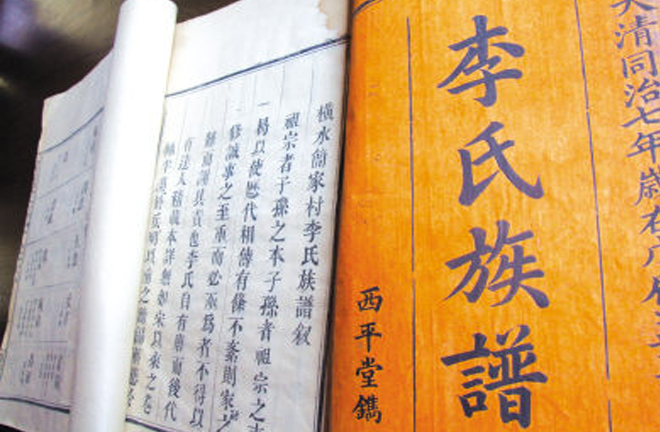Seeking academic value in folk documents

Folk documents have many forms, such as the genealogy in the above picture. Photo: FILE
As more folk documents have been identified, their academic value has been gradually realized. Folk documents refer to textual materials formed during people’s daily lives, which include many forms such as genealogy, inscriptions, contracts, letters and diaries. It covers social, economic, political, cultural and many other fields.
Zhang Si, a professor at the Faculty of History at Nankai University, said that the study of folk documents can illustrate the history of ordinary people. The role of ordinary people and their lives in history is by no means insignificant and dispensable. Historical research would be pale and powerless without the history of ordinary people.
Yang Hua, the director of the Center of Traditional Chinese Culture Studies at Wuhan University, said that folk documents in the Ming and Qing dynasties, including folk contracts, inscriptions and genealogy, are new materials for promoting ritual study in the Ming and Qing dynasties.
Zhou Ya, an associate professor at the Research Center for Chinese Social History at Shanxi University, said that folk documents have brought new historical materials, new perspectives and new discourse to historical research. Despite the fact that most folk documents have not been included in official archives, folk documents are actually a new form of material that can help researchers discover and cross-reference history. Not only that, folk documents are an important carrier of traditional Chinese culture, which reflects the national identity and temporal and spatial properties of Chinese culture.
The diversity, triviality and continuity of life in society have determined that folk documents have many types, large quantities and complex forms of information. Zhang said that folk documents have not been fully utilized by scholars in their past research. At the same time, due to the complexity of folk documents, there are many challenges in their identification and utilization. Therefore, we can try to institute a study of folk document history.
As an important type of folk document, inscriptions have become a focus of research in current academic circles. Scholars in the fields of history, folklore, anthropology and sociology have carefully studied the inscription literature. Wu Xin, a professor at the Canal Subject Research College at Liaocheng University, said that inscriptions have certain limitations in writing format, purpose and content. Therefore, they should not be used alone as historical materials. Instead, they should be combined with other historical materials to form a chain of evidence.
As to existing problems in the usage of folk documents, the normative issue should be highlighted. Academic circles have published many folk documents, but their classification and arrangement is very different. Furthermore, as a kind of text that transcends time and space, past folk documents are quite different from the present in terms of writing, language expression and terminology. This often leads to misinterpretation or misunderstanding. Finally, the regional and individual nature of folk documents provides excellent materials for scholars to carry out regional and case studies with distinctive characteristics, Zhou said.
Zhang said that in order to better study folk documents, it is necessary to use field investigations and archaeological methods to verify and examine them, to understand their background and authorship and to study from the perspective of the author.
Zhou said that for better research, it is necessary to study folk documents from the perspective of philology. This means not only to examine the holistic and individual generation, development and extinction of folk documents vertically, but also to study their subject, form, content and value horizontally to fully reveal the story behind them. At the same time, a folk document database should be built to digitally process a large number of scattered, regional, and chaotic folk documents, to store them into the “cloud” and establish data relevance. This is an important direction to improve the level of research.
Considering many folk documents have not been paid attention to, the scope of folk document study should be expanded. Furthermore, the research on the folk documents of ethnic groups needs to be deepened, Yang added.
edited by YANG LANLAN
